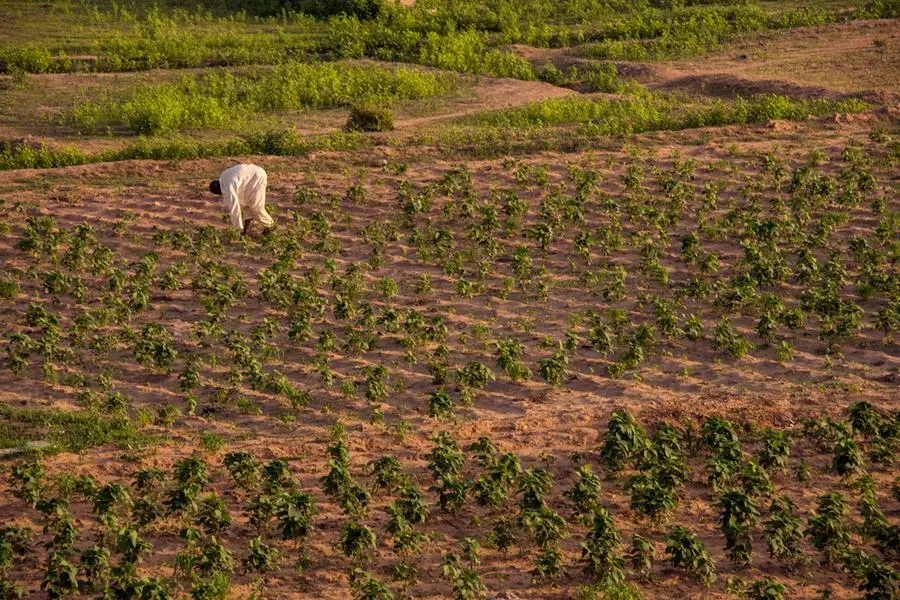PHOTO
OVER the years, farmers in Nigeria have struggled with crop loss due to insect and pest attacks. This has resulted in significant financial losses for many farmers, causing frustration and driving some out of business. Those who continue to farm face this ongoing nightmare.
To remain in business and achieve a good harvest, farmers have resorted to using chemical pesticides to control pests and insects. However, the health implications of using these chemicals are often overlooked.
According to Dr Nosakkare Erhunmwunse from the University of Benin, in an article published on ResearchGate in 2012, “about 15,000 metric tons of pesticides, comprising about 135 pesticide chemicals are imported annually into the country. They are the major causes of cancer, cardiovascular disease, dermatitis, birth defects, morbidity, impaired immune function, neurobehavioral disorder and allergy sensitization reaction”
Related PostsIFAD has committed $1.5bn in Nigeria’s agric sector, Associate VP saysDon suggests technological approach to agriculture in NigeriaTrade relations: Nigeria, Benin hold strategic high-level meeting
Chemical pesticides, regardless of their importance in crop production, have hazardous effects on both the environment and the farmers themselves.
Concerned about the potential consequences for Nigerian farmers and the environment as a whole, the African Agricultural Technology Foundation (AATF) has supported the production of genetically modified crops.
These transgenic crops have been developed to resist pests and insects that would otherwise require constant chemical spraying for control.
The AATF has supported the development of Pod Borer resistant Cowpea, BT Cotton, and TELA maize. These crops have been designed to maximise water utilisation, resist certain pests, and increase overall yield.
Recently, a former Minister of Agriculture and Food Security, Dr. Mohammed Abubakar, emphasised the importance of healthy plants for food security.
He stated that the ability of Nigeria to meet its nutritional needs and dietary preferences relies on the status of plant health.
Healthy plants also inspire confidence among trading partners regarding the quality and safety of Nigeria’s exported plants and plant products.
Abubakar further highlighted the challenge of uncontrolled use of plant protection products in plant health. He explained that the indiscriminate use of lethal chemicals like sniper for storing and growing food is dangerous. Misuse of pesticides and herbicides can pose threats to human and animal health, as well as the environment.
“The World Trade Organisation (WTO) categorizes these plant contaminants and pests as trade impediments,” the former Minister said.
Also, during the inauguration of the Standing Inter-Ministerial Technical Committee on Zero Reject of Agricultural Commodities and Produce/Non-Oil Exports, Dr. Vincent Isegbe, the former Director General of the Nigeria Agricultural Quarantine Service (NAQS), stated that the European Union banned the importation of Nigeria’s dried beans due to high levels of pesticides residues that are considered dangerous to human health.
Isegbe emphasised that although Nigeria is the largest producer of dried cowpea, accounting for 46 percent of global yield and 48 percent of African output, the country cannot dominate the global cowpea market due to contaminated products.
These findings highlight that the use of chemical pesticides not only affects humans and the environment but also impedes international trade, thereby limiting farmers’ income and posing a threat to the economy.
Genetically-modified crops have proven to be a game-changer in terms of protecting health and boosting the economy. According to a survey conducted by the Small Scale Women Farmers Organization of Nigeria and the Alliance for Action on Pesticides, as reported by Premium Times in 2022, approximately 80 percent of the pesticides used by women farmers in certain parts of the country are highly toxic and require additional regulation.
These chemicals include atrazine, butachlor, carbofuran, cypermethrin, dichlorvos, endosulfan, glysulphate, imidacloprid, mancozeb, paraquat, profenofos, and triazophos.
“The survey results among the interviewed women farmers show that over 80 percent of the pesticide products and their active ingredients in use belong to the category of Highly Hazardous Pesticides (HHPs) and in many instances have lost approval in countries and regions with high safety standards such as the European Union (EU),” stated the report.
A recent report by the National Stored Products Research Institute (NSPRI) revealed that Nigerian farmers and agro-based companies spend $400 million annually on purchasing pesticides most of which are banned and not allowed for usage in most countries. The NSPRI also highlighted that improper pesticide use has caused frequent illnesses among millions of people across the country.
Ultimately, the use of chemical pesticides to control pests and insects poses risks to farmers, consumers, and the environment. The solution to this issue lies in supporting and investing in genetically modified crops, which have the ability to reduce the use of chemical pesticides while increasing productivity.
By taking this approach, Nigeria can reclaim its position in the international market, farmers can earn higher incomes, the economy will thrive, and healthier food and environments will be available for humans and animals alike.
The Nigerian government is expected to strengthen-legislation and policies to limit the importation of chemical pesticides. Additionally, the government should strengthen collaboration with organisations like the AATF, founded in 2003 to address Africa’s food security prospects through agricultural technology.
AATF believes that the agricultural sector is a key foundational pillar as Africa consolidates its economic growth and carves out its new position as a major global economic powerhouse and the next growth market in the world. It was formed in response to the need for an effective mechanism that would facilitate and support negotiation for technology access and delivery and formation of appropriate partnerships to manage the development & deployment of innovative technologies for use by smallholder farmers in SSA:
AATF, through its mission of transforming lives through technology, is leading the development of insect and pest-resistant, as well as high-yielding, crops on the African continent.
Copyright © 2022 Nigerian Tribune Provided by SyndiGate Media Inc. (Syndigate.info).




















